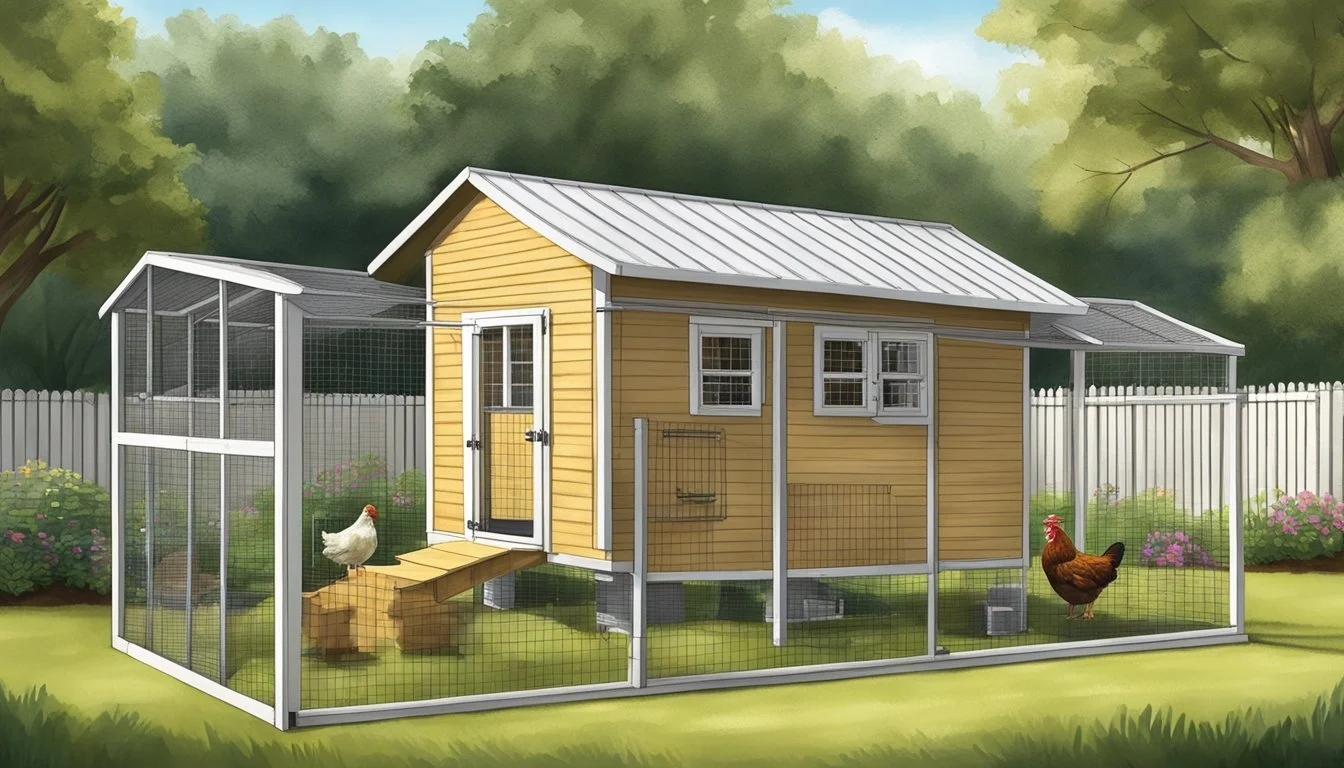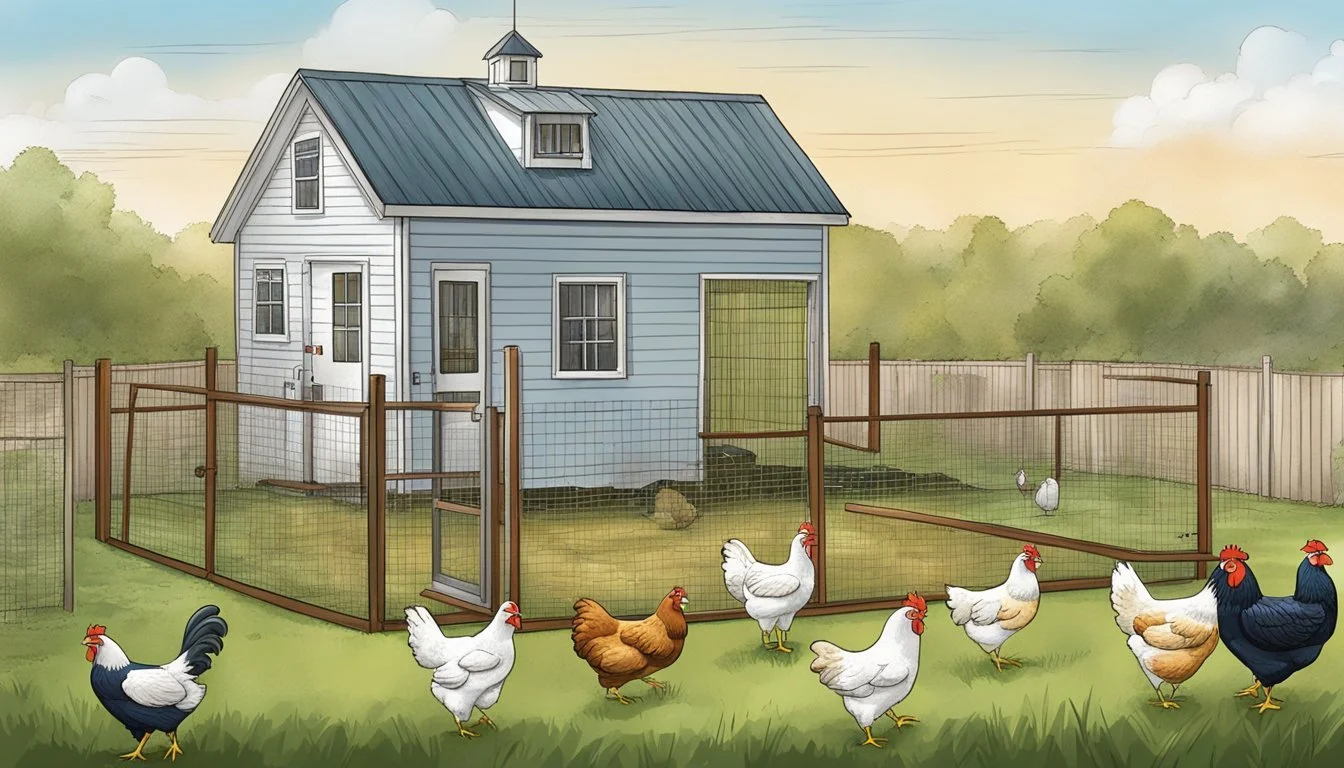Keeping Backyard Chickens in Mobile, AL
A Guide to Local Regulations and Best Practices
Backyard chicken keeping in Mobile, Alabama, offers residents the opportunity to enjoy fresh eggs, natural pest control, and the pleasures of caring for these birds. The city acknowledges the growing interest in urban agriculture and has set regulations to ensure that the practice is carried out responsibly. Within city limits, individuals are allowed to keep hens, but roosters are prohibited to prevent noise disturbances.
To maintain harmony with neighbors and ensure the health and safety of the chickens, Mobile has outlined specific requirements. Property size dictates the number of hens that can be kept; for example, lots smaller than 10,000 square feet are limited to a maximum of four hens. Coop restrictions are also in place, and these are detailed in the local ordinances.
Furthermore, those in the Mobile Bay Area have access to community support through groups such as the Mobile Bay Area Backyard Chicken Club, which focuses on responsible flock management. This organization is instrumental in providing education and resources for both experienced poultry keepers and newcomers to the hobby, emphasizing the importance of adherence to local laws and guidelines.
Local Laws and Regulations
In Mobile, Alabama, residents interested in keeping backyard chickens are subject to specific local ordinances and state regulations. Understanding and complying with these rules is essential for lawful and responsible chicken keeping.
Understanding City Ordinances
In the City of Mobile, backyard chicken keeping is permitted, but it is governed by ordinances that outline restrictions on the number and type of chickens:
Roosters: Prohibited due to noise concerns.
Hens: Allowed, with limitations on quantity based on property size.
For properties less than 10,000 square feet, residents can keep a maximum of four hens. Residents must ensure that chicken coops are at least 40 feet away from neighboring houses and comply with an 8-foot setback from property lines for all structures, ensuring that chickens have adequate space and that neighbors are not disturbed.
Alabama State Poultry Regulations
Alabama's state regulations provide guidelines for poultry health and welfare. These rules extend to backyard flocks. Statewide regulations may outline vaccination requirements and health standards to prevent the spread of diseases and ensure the well-being of the birds. Residents of Mobile must also be aware of the broader Alabama state poultry regulations that govern the keeping of chickens to ensure they are not only abiding by city legislation but also state laws.
Mobile County Specifics
In Mobile County, local government has established additional regulations specific to the area. The county stipulations resonate with the city's ordinance but may have different restrictions depending on the zoning:
Residential-Agricultural (R-A) Districts: Typically, broader allowances for poultry keeping, including roosters.
Housing Requirements: Chickens must be provided with proper shelter, such as a coop or fenced yard.
Permits are not explicitly mentioned in the available information, but residents should verify with local government offices to confirm if a permit is needed and understand all requirements before starting a backyard flock. Regulations may differ between the city and outlying areas, so pinpoint understanding of the locale is pivotal.
Residents in nearby cities such as Huntsville, Birmingham, Montgomery, or in Baldwin County like Daphne, should consult their local chicken ordinances, as rules can vary significantly from one jurisdiction to another.
Setting Up Your Coop
When setting up a chicken coop in Mobile, Alabama, it's important to choose an appropriate location, comply with local housing requirements, and create a design that ensures the safety and comfort of your chickens.
Choosing the Right Location
Identifying the ideal spot for a chicken coop involves consideration of sunlight, drainage, and distance from neighboring properties. The coop should receive adequate sunlight to maintain a warm environment during colder months. Drainage is crucial to prevent water accumulation that could lead to unsanitary conditions. Coops must be situated at a minimum distance of 150 feet from any adjacent lot line or dwelling not owned by the keeper to uphold local ordinances.
Complying with Housing Requirements
Local housing requirements state that only hens are permitted; roosters are excluded to avoid noise complaints. The size of your chicken house must also reflect the number of hens and the property size. For lots under 10,000 square feet, a maximum of four hens is the standard. When considering coop placement, ensure that the structure does not encroach upon property lines and adheres to setback requirements.
Designing for Safety and Comfort
A well-designed chicken coop provides shelter, ventilation, and protection against predators. Secure latches are essential to prevent animals such as raccoons from gaining access. A chicken house should also include an attached run, to provide space for the chickens to move freely. The coop must be constructed to offer:
Ventilation: Mesh windows with secure latches to maintain air circulation.
Insulation: Proper materials to keep the coop warm during cooler weather.
Space: An ample area based on the bird's size; typically 2-3 square feet indoors and 8-10 square feet in the run area per hen.
When it's time to build a chicken coop, thorough planning and strict adherence to local laws ensure that your chickens live in a safe, comfortable environment compliant with Mobile's requirements.
Chicken Care Essentials
Maintaining the health and happiness of backyard chickens in Mobile requires attention to their basic needs, including appropriate feeding, water supply, and hygiene practices.
Feeding and Nutrition
Chickens require a balanced diet to stay healthy and produce quality eggs. Their food should consist of:
Starter Feed: High in protein, it's essential for chicks up to 6 weeks old.
Grower Feed: Adequately supports growth from 6 to 20 weeks.
Layer Feed: Lower in protein but has calcium necessary for laying hens.
It's crucial to not overfeed and to monitor the chickens to prevent health issues related to improper nutrition. Treats should be given sparingly to avoid obesity and should not exceed 10% of the chicken's diet.
Water Supply and Hygiene
Chickens must always have access to clean, fresh water. Water containers should be:
Cleaned Regularly: To prevent the buildup of algae and bacteria.
Refilled Daily: Ensuring water is always available and clean.
Dirty water can lead to health issues and is a potential nuisance if left unattended.
Routine Cleaning Practices
Regular coop cleaning is critical to preventing diseases and keeping the area free from nuisances such as odors and flies. A basic cleaning schedule should include:
Daily: Remove and replace any wet or soiled bedding.
Weekly: Clean out and refresh the nesting boxes and floor of the coop.
Monthly: Conduct a thorough cleaning of the entire coop, including walls and roosts.
Proper waste management is crucial as accumulated droppings may lead to respiratory issues and attract pests.
Managing Your Flock
In Mobile, Alabama, managing a backyard flock effectively entails understanding flock dynamics, maintaining breeding and egg handling practices, and implementing strategies for noise control and rooster management.
Understanding Flock Dynamics
Backyard flocks in Mobile thrive when the social structure, or pecking order, is established and maintained. Observing interactions can help prevent bullying, especially when introducing new pullets. Predators are a significant threat, so secure housing should be a priority. The city requires coops to be placed at least 40 feet from neighbors, reducing the chance of attracting unwanted rodents or predators to neighboring properties.
Handling Eggs and Breeding
Successful breeding requires monitoring hen health and egg fertility. Hens should lay in clean nesting boxes, with eggs collected daily to ensure freshness. Record keeping can aid in managing breeding cycles and track lineage of chicks. Mobile regulations allow a considerable number of chickens, however, specific lead practices for keeping domestic fowl help maintain a healthy flock.
Dealing with Roosters and Noise Control
While raising roosters contributes to flock dynamics and breeding, noise control is imperative. It’s essential to understand that even though up to 25 hens are allowed within city limits, roosters may be subject to different regulations due to their crowing. Implementing soundproofing measures in the coop and strategically placing it can minimize disturbance to neighbors. Coops should also adhere to an 8-foot setback from property lines, as per local ordinances.
By adhering to these guidelines and monitoring your flock carefully, you can ensure a healthy and happy environment for your backyard chickens in Mobile, Alabama.
Community and Legal Considerations
When keeping backyard chickens in Mobile, Alabama, residents need to navigate local regulations carefully and consider their impact on the community. They should understand the importance of addressing neighbor concerns, dealing with potential nuisances, and adhering to slaughtering regulations.
Navigating Neighbor Relations
The proximity of chicken coops to neighboring properties is regulated to ensure harmony within the community. City ordinances mandate specific distances: structures like coops must be at least 40 feet away from a neighbor's residence. Residents must also maintain an 8-foot setback from property lines for all structures, which includes chicken coops. Prioritizing communication and transparency with neighbors can prevent disputes and foster cooperative relationships.
Dealing with Public Nuisances
Chickens can be a source of public nuisance if not managed correctly. Roosters are not permitted in Mobile due to their noise, but even hen vocalizations and odors from a coop can become a nuisance. To minimize issues, residents must contain their chickens within their property limits, preventing them from roaming and potentially causing disturbances or damage. Regular coop cleaning also helps to keep smells in check.
Understanding Slaughtering Regulations
Slaughtering chickens within city limits is subject to local slaughtering regulations. Residents interested in processing chickens for personal consumption must do so in a manner that prevents public nuisance and adheres to humane and health standards. Public display or commercial slaughtering is typically prohibited, and individuals should seek further education on the correct and legal process.
Permits and Compliance
Residents of Mobile, Alabama who wish to keep backyard chickens must navigate a series of regulations to ensure they are in compliance with local ordinances. This involves obtaining the proper permits, adhering to regular inspections, and interacting with animal control.
Acquiring Necessary Permits
In Mobile, a permit is required for residents to legally keep backyard chickens. The city stipulates that only hens are permitted; roosters are excluded due to noise concerns. To begin the process, residents must contact the City Clerk's Office. The application requires adherence to location-based restrictions, such as:
Property size: For lots under 10,000 square feet, up to four hens are allowed.
Coop placement: Coops must be at least 40 feet away from neighbors and have an 8-foot setback from all structures.
Regular Inspections and Compliance
After obtaining a permit, chicken owners may be subject to regular inspections to ensure ongoing compliance with the city’s regulations. Inspections focus on confirming that:
Appropriate care is provided, including adequate housing, food, and water.
Manure management practices are in place to avert health and environmental issues.
Compliance with these standards is crucial for the permit to remain valid.
Animal Control Interaction
Animal control officers in Mobile are responsible for oversight of backyard chicken regulations. They play a key role in:
Enforcing regulations by addressing any violations which may include improper coop conditions or excess numbers of chickens.
Responding to complaints from neighbors concerning potential issues like noise, smells, or stray chickens.
Residents must maintain open communication with animal control to resolve any issues and ensure their chicken-keeping practices remain within the bounds of the law.
Comparative Analysis of Local Areas
Different areas within Alabama each have distinct regulations concerning backyard chicken keeping. It is important for residents to understand local ordinances to ensure compliance.
Chicken Keeping in Birmingham
In Birmingham, residents can keep chickens on their property as long as they abide by certain conditions set by local ordinances. Properties need to be zoned appropriately and there is a limit on the number of chickens one can own, usually without the allowance of roosters due to noise concerns.
Montgomery City Specifics
Montgomery has its own set of specific regulations for raising chickens within city limits. Local laws dictate setback requirements from property lines and neighboring structures. Montgomery often requires residents to obtain a permit for keeping poultry, stressing on the coop's placement and maintenance.
Daphne and Baldwin County Insights
Daphne, within Baldwin County, allows residents to keep backyard chickens; however, restrictions vary by zone. Baldwin County in general has more relaxed rules in rural areas but can be stricter in urban locales. Residents should consult county-specific resources for detailed information on the number of hens and property size requirements.
Auburn Local Ordinances
Auburn residents interested in raising chickens must comply with local zoning laws which typically influence the permissible number of chickens and the need for permits. Ordinances are in place to ensure proper sanitation and management of chickens to mitigate any potential nuisance to the neighborhood.









